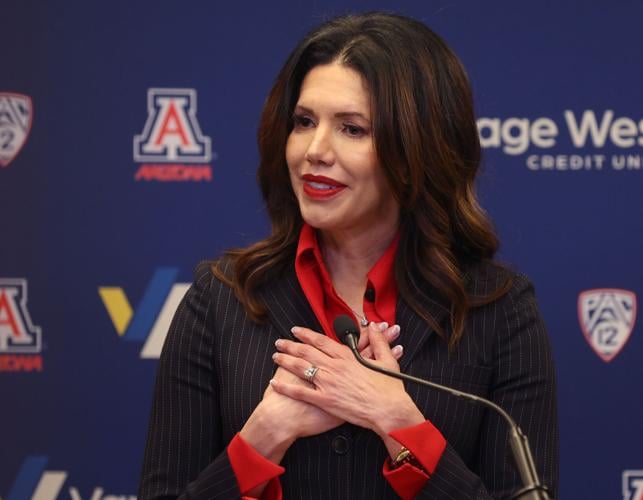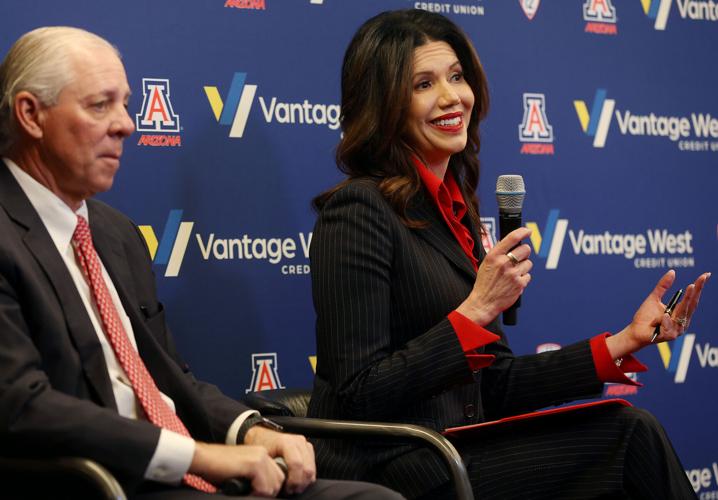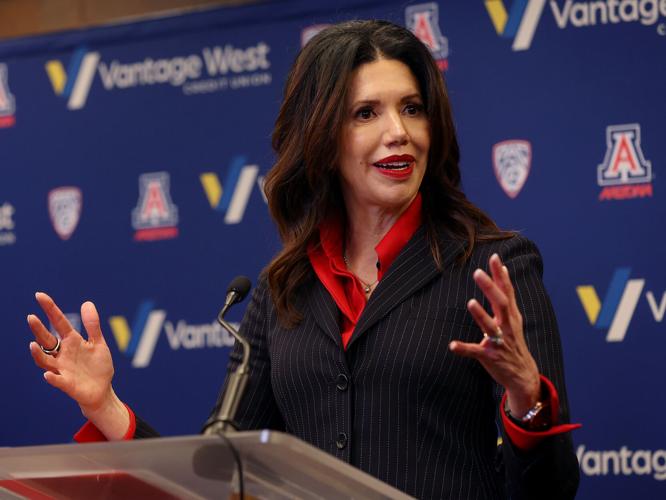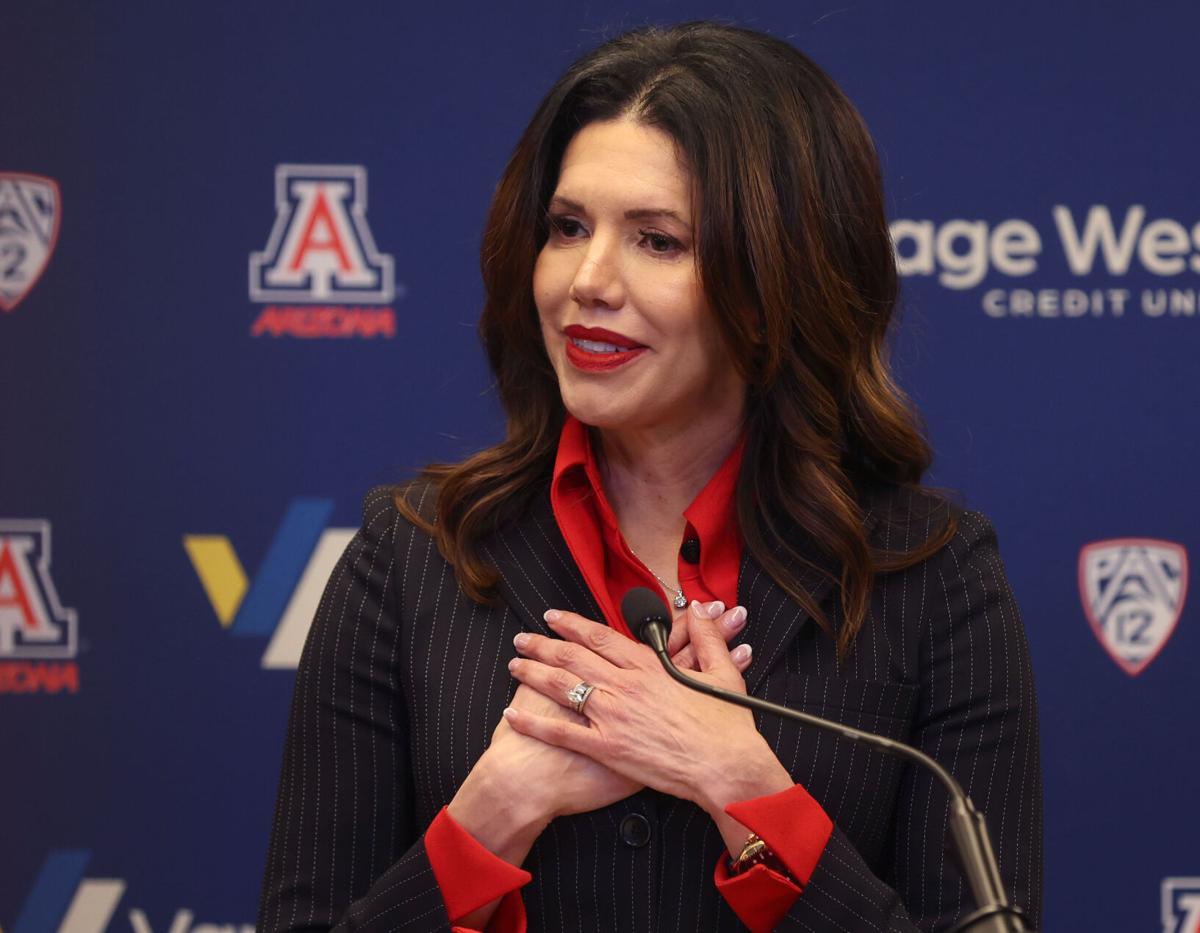Saying she is “forever grateful” to Arizona for supporting her as a law school student during a challenging period in her life three decades ago, Desireé Reed-Francois is now returning to Tucson to take on what could be her biggest professional challenge yet.
As Arizona’s new athletic director, Reed-Francois will oversee an unprofitable athletic department that has taken $86 million in loans since 2018 from a school that is operating a $177 million deficit and in a college sports environment that UA President Robert Robbins says is “in the ICU.”
Yet, during her introductory news conference Tuesday morning, Reed-Francois embraced it all.
“While these are challenging times in college athletics, you know what challenges bring? Opportunities,” Reed-Francois said. “I am so filled with excitement for the journey ahead.”
While again thanking donors who are paying for a fifth of Reed-Francois’ $1.25 million compensation package — and a fifth of UA basketball coach Tommy Lloyd’s new $27.9 million package — Robbins expressed similar enthusiasm.

Desireé Reed-Francois was officially introduced by University of Arizona president Robert Robbins on Tuesday as the UA's new athletic director. Reed-Francois comes to Tucson from the University of Missouri.
“This is a critical moment for Arizona athletics,” Robbins said. “We need someone strong, someone with a national voice. Someone with a track record of raising revenue, stewarding resources and providing strong financial oversight. Someone unafraid to come in right now and help us.
“We are so fortunate that Desireé Reed-Francois said 'yes.' She is exactly what we need right now.”
Robbins matched Francois-Reed’s $1.25 million salary at Missouri by offering her $1 million of university-paid funds and another $250,000 from the University of Arizona Foundation.
At the same time, Robbins assembled a five-year deal for Lloyd that includes roughly $5.8 million in donor contributions to cover the difference in the basketball coach’s salary over what he was scheduled to be paid per the terms of his April 2022 contract. The UA announced Reed-Francois's hiring and Lloyd's restructured deal Monday a few hours apart.
Robbins is already facing what he called a $177 million university-wide deficit, with the UA on the hook to pay $1.05 million to former UA Athletic Director Dave Heeke; Heeke was removed last month with nearly 15 months left on his contract. But UA said donor funds will also cover the cost of Heeke’s buyout and any retention bonuses or buyout expenses for Reed-Francois. The Post-Dispatch reported Monday that Missouri is due a buyout worth approximately $2.5 million tied to the departure of Reed-Francois.
Both deals are subject to Arizona Board of Regents approval. But after Robbins and Francois-Reed took questions jointly on a stage inside Arizona Stadium, Robbins told the Star that he ran his plans to use extra donor funds by the regents.
“I told ABOR we were not going to use any university funds, that I wanted to go secure Tommy and I wanted to get a world-class leader,” Robbins said. “Those were going to take resources and (Robbins said he told ABOR) that I would not use a penny of university funds to do it.”
Reed-Francois’ university-paid salary of $1 million is $105,000 more than Heeke was scheduled to be paid in 2024-25. UA will continue to pay Lloyd the $3.8 million in university funds plus an extra $1.15 million in donor funds next season; over the life of Lloyd’s new five-year deal donors will pay about $5.8 million extra.
Even with the donor funds, Reed-Francois is not receiving a raise to take the UA job. Reed-Francois has been noted for fundraising prowess at Missouri, though the St. Louis Post-Dispatch reported that University of Missouri leadership recently established an oversight committee to monitor athletics that could have been a “possible point of friction” between Reed-Francois and upper-level administrators.

Desireé Reed-Francois is the new athletic director at the University of Arizona. She spoke about the role and challenges facing college athletics during an introductory press conference Tuesday at Arizona Stadium.
But when asked what role the oversight committee's creation played in her decision to leave, Reed-Francois said it did not.
“I came to the University of Arizona, not leaving the University of Missouri,” she said. “I came to the University of Arizona because I'm just so excited to come home.”
A native of the San Francisco Bay area, Reed-Francois was a walk-on rower at UCLA who earned an undergraduate degree there and then a law degree from Arizona in 1997. She said as a first-year law student, her brother took a blow to the neck after making a tackle during a junior college football game in the Bay Area and became a quadriplegic.
Reed-Francois said her brother rehabilitated in Palm Springs, California, and that she would often travel there to offer support between Fridays and Sundays while taking classes at UA that went through Thursdays.
“Everybody in the administration, and my professors, they all like checked in and made sure I was doing OK,” Reed-Francois said. “It really meant a lot. I felt very seen and cared for.”
After graduating from UA with her law degree, Reed-Francois began a fast-moving and ever-changing move up the college sports ladder. She worked in a variety of compliance and administrative roles at the University of San Francisco, Cal, San Jose State, Santa Clara, Fresno State, Tennessee, Cincinnati and Virginia Tech before becoming UNLV’s athletic director in April 2017.
There, Reed-Francois led a $60 million developmental drive, including an $8 million estate gift, according to her Missouri bio.
Reed-Francois became Missouri’s AD in 2021 and, according to the Post-Dispatch, spearheaded a plan to renovate its football stadium while bringing in a record $62 million donation to athletics.
“Look at what just happened at Missouri,” Robbins said, making it clear during and after the news conference that Reed-Francois’ fundraising skills were a major reason for hiring her.
During the news conference, Robbins said that he and Reed-Francois hadn’t discussed the $87 million in institutional loans but that he had talked about it with interim UA CFO John Arnold. Asked if the debt would be completely forgiven or if Reed-Francois would need to formulate a repayment plan, Robbins didn't say either way, but said he was confident in the direction Reed-Francois will take the department once she meets with UA financial executives to discuss the situation.
“There will have to be some restructuring — and we give loans across the university all the time,” Robbins said. “So we'll have to work with Desireé and her team to figure out what that means. Usually these loans are given, like all the improvements of the football stadium, the new softball stadium, the renovations of the pool, improvements we made at Hi Corbett (for baseball)."
Robbins said the athletic department has been repaying debt service on the facility improvements, though UA also gave athletics $55 million to help out during the financial crisis created by COVID limitations in the 2020-21 academic year.
Arizona currently fields 22 NCAA varsity sports, which is higher than the average of the university's future Big 12 counterparts. When asked Tuesday if reducing the number of sports programs offered is a viable option toward cost savings, Reed-Francois responded directly with a one-word answer: "No," she said.
“We will have to sit down and take a holistic approach to the athletics budget as well as the university budget," Robbins said. “We will have a plan, and I feel confident in that 18- to 36-month timeframe, we will be on good solid ground.”
Reed-Francois expressed similar confidence about doing so in a place she repeatedly called “home,” appearing to choke up during her introductory remarks when referring to her brother’s health when she was a law student.
“I got a little bit emotional on the podium because this is a heart move,” she said. “This is a move where I know what the University of Arizona can be. I know there are challenges, but I know we have incredible support. We have incredible leadership. And I felt like the University of Arizona was there for me when I needed them.
“Now, my skillset, I believe, meets what the University of Arizona needs at this time. It’s a critically important time when there are so many challenges throughout college athletics. Not only here at the University of Arizona, but throughout the entire enterprise. So it just felt right. It was an opportunity to come home.”







